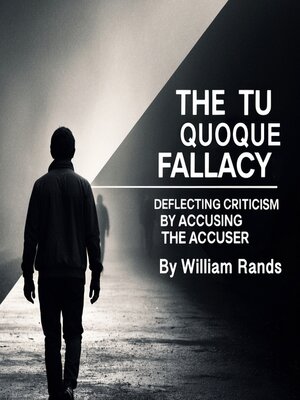The Tu Quoque Fallacy
audiobook (Unabridged) ∣ Deflecting Criticism by Accusing the Accuser
By William Rands

Sign up to save your library
With an OverDrive account, you can save your favorite libraries for at-a-glance information about availability. Find out more about OverDrive accounts.
Find this title in Libby, the library reading app by OverDrive.



Search for a digital library with this title
Title found at these libraries:
| Library Name | Distance |
|---|---|
| Loading... |
The Tu Quoque fallacy, often referred to as the "appeal to hypocrisy," is a form of argumentation where an individual deflects criticism by accusing the accuser of the same flaw or wrongdoing. Instead of addressing the substance of the criticism, the person making this fallacious argument focuses on the accuser's behavior, thereby shifting the attention away from the original issue. This technique is often employed to avoid dealing with uncomfortable truths and to undermine the credibility of the person making the accusation. While the Tu Quoque fallacy may seem like a valid rebuttal in certain situations, it is inherently flawed because it does not address the merit of the argument but instead aims to discredit the opponent by pointing out their perceived hypocrisy.
The term "Tu Quoque" is derived from Latin, meaning "you too" or "you also." It is a logical misstep in which the argument shifts from the issue at hand to the behavior or actions of the accuser. For example, if person A criticizes person B for smoking, and person B responds by saying, "But you smoke too," this response deflects the criticism without actually addressing the harmful effects of smoking. By focusing on the accuser's actions, the fallacy diverts attention from the original point and diminishes the potential for meaningful discussion.
This fallacy is common in many aspects of modern discourse, particularly in political debates, social media discussions, and even in personal relationships. In public debates, individuals or groups may use the Tu Quoque fallacy to avoid engaging with difficult questions, redirecting the conversation toward the alleged hypocrisy of their opponents rather than addressing the real issues. In personal relationships, it may appear as a defensive reaction to avoid taking responsibility for one's actions or mistakes.







